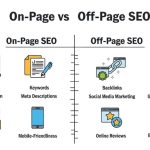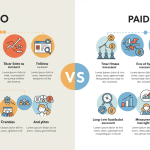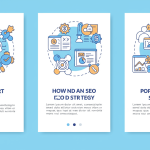
SEO marketing combines the technical precision of search engine optimization with the strategic thinking of digital marketing to create a powerful approach for sustainable business growth. Unlike paid advertising that stops delivering results the moment you stop paying, SEO marketing builds long-term value by establishing your brand as a trusted authority in your industry.
Understanding SEO Marketing Fundamentals
SEO marketing encompasses all the strategies and techniques used to improve your website’s visibility in search engine results while supporting broader marketing objectives. It goes beyond traditional SEO by focusing on how search optimization contributes to customer acquisition, brand building, and revenue generation.
The approach integrates keyword research with customer journey mapping, content creation with lead generation, and technical optimization with conversion rate optimization. This holistic perspective ensures that every SEO effort supports your overall marketing goals.
Modern SEO marketing recognizes that search engines have evolved far beyond simple keyword matching. Google’s algorithm now prioritizes user experience, content quality, and search intent satisfaction. This shift means successful SEO marketing requires understanding your audience’s needs and creating content that genuinely solves their problems.
The Business Impact of SEO Marketing
SEO marketing delivers measurable business results that extend far beyond improved search rankings. Companies that invest in comprehensive SEO marketing strategies typically see significant improvements in brand visibility, lead quality, and customer lifetime value.
Research shows that organic search drives 53% of all website traffic, making it the largest source of trackable web traffic. More importantly, organic search visitors convert at higher rates than paid traffic because they’re actively seeking solutions to their problems.
The compound effect of SEO marketing becomes particularly powerful over time. While paid advertising delivers immediate results that disappear when spending stops, SEO marketing builds cumulative value. Well-optimized content continues attracting qualified prospects months or years after publication.
Keyword Research for Marketing Success
Effective SEO marketing begins with strategic keyword research that aligns with your customer journey and business objectives. This process involves identifying terms your target audience uses when searching for solutions you provide.
Understanding Search Intent
Search intent represents the underlying goal behind a search query. Understanding intent helps you create content that matches what users actually want to find, improving both rankings and user satisfaction.
Informational intent involves users seeking knowledge or answers to questions. These searches often use terms like “how to,” “what is,” or “guide to.” Commercial investigation intent includes users researching products or services before making a purchase decision. These searches might include “best,” “reviews,” or “comparison” terms.
Navigational intent occurs when users search for specific websites or brands. Transactional intent represents users ready to make a purchase or take action, often including terms like “buy,” “discount,” or “near me.”
Building Keyword Strategies
Successful keyword strategies balance search volume, competition, and business relevance. High-volume keywords attract more traffic but face intense competition. Long-tail keywords typically have lower volume but higher conversion rates due to their specificity.
Start by identifying seed keywords that describe your core products or services. Use keyword research tools to expand this list with related terms, questions, and variations. Analyze competitor keywords to identify gaps and opportunities in your market.
Organize keywords into topic clusters that support different stages of the customer journey. Awareness-stage keywords help attract new prospects, consideration-stage keywords support the research process, and decision-stage keywords target users ready to purchase.
Content Marketing Integration
SEO marketing and content marketing work together to create a powerful customer acquisition system. Content provides the vehicle for targeting keywords while delivering value to your audience.
Creating Customer-Focused Content
Effective SEO content addresses specific customer needs and questions while naturally incorporating target keywords. This approach ensures your content ranks well while providing genuine value to readers.
Start by mapping customer questions and pain points to specific keywords. Create comprehensive content that thoroughly addresses these topics. Include practical examples, actionable advice, and clear next steps that guide readers toward your products or services.
Successful content often combines multiple related keywords and topics in a single piece. This approach, called topical authority, helps search engines understand your expertise while providing comprehensive value to readers.
Content Types for SEO Marketing
Different content types serve different purposes in your SEO marketing strategy. Blog posts excel at targeting informational keywords and building thought leadership. Landing pages optimize for commercial and transactional keywords while focusing on conversion.
Resource pages and guides target broad, high-value keywords while positioning your brand as an authority. Case studies and testimonials build trust while targeting specific industry or solution keywords. Video content and infographics diversify your content portfolio while appealing to different learning preferences.
Technical SEO for Marketing Goals
Technical SEO ensures search engines can effectively crawl, index, and rank your content. Poor technical SEO can prevent even excellent content from achieving its marketing potential.
Site Speed and User Experience
Page speed directly impacts both search rankings and conversion rates. Users expect pages to load quickly, and search engines reward sites that provide excellent user experiences.
Optimize images by compressing files and using modern formats like WebP. Minimize HTTP requests by combining CSS and JavaScript files. Implement browser caching to reduce server load and improve repeat visitor experiences.
Mobile optimization is crucial since most searches now occur on mobile devices. Ensure your site provides excellent mobile experiences with responsive design, fast loading times, and easy navigation.
Conversion-Focused Technical Elements
Technical SEO for marketing includes elements that directly impact conversion rates. Page structure, internal linking, and call-to-action placement all influence whether visitors take desired actions.
Implement schema markup to enhance your search result appearance with rich snippets. Create clear navigation that guides users toward high-value pages. Optimize forms and checkout processes to reduce friction and improve conversion rates.
Link Building for Brand Authority

Link building remains a crucial component of SEO marketing, but modern approaches focus on building genuine relationships and creating valuable resources that naturally attract links.
Content-Driven Link Building
The most effective link building strategies center on creating exceptional content that others want to reference and share. This approach builds both search authority and brand recognition.
Develop original research, surveys, and studies that provide unique insights into your industry. Create comprehensive guides and resources that become go-to references for your topic. Design tools, calculators, and interactive content that provides practical value to your audience.
Relationship Building Strategies
Building relationships with industry influencers, journalists, and other businesses creates ongoing opportunities for link building and brand exposure. Focus on providing value before asking for anything in return.
Engage with industry publications by sharing insights and commenting on articles. Participate in industry events and conferences to build face-to-face relationships. Collaborate with complementary businesses on content and cross-promotional opportunities.
Local SEO Marketing
For businesses serving local customers, local SEO marketing focuses on dominating location-based searches and building community presence.
Google My Business Optimization
Google My Business serves as your primary local search presence. Complete optimization includes accurate business information, compelling descriptions, and regular updates.
Maintain consistent NAP (Name, Address, Phone) information across all online directories. Actively manage customer reviews by responding professionally and encouraging satisfied customers to leave feedback. Share regular updates and posts to keep your listing active and engaging.
Local Content Strategies
Create content that serves your local community while targeting location-specific keywords. This approach builds local authority while attracting customers in your service area.
Develop location-specific landing pages for each area you serve. Create content about local events, news, and community involvement. Partner with local businesses and organizations for cross-promotional opportunities.
Measuring SEO Marketing Success
Effective SEO marketing requires tracking metrics that directly relate to your business goals. Rankings matter, but traffic, leads, and revenue matter more for business success.
Key Performance Indicators
Monitor organic traffic growth and keyword ranking improvements, but focus on conversion-related metrics. Track leads generated from organic search, customer acquisition costs, and lifetime value of SEO-acquired customers.
Analyze user behavior metrics like bounce rate, time on site, and pages per session to understand content effectiveness. Monitor brand awareness metrics including branded search volume and social media mentions.
ROI Measurement
Calculate SEO marketing ROI by comparing organic traffic value to investment costs. Assign monetary values to different types of conversions and track how SEO contributes to overall revenue.
Use attribution modeling to understand how SEO supports the entire customer journey. Many customers interact with multiple touchpoints before converting, and SEO often plays a crucial role in early-stage awareness and consideration.
Building Your SEO Marketing Strategy
Successful SEO marketing requires a comprehensive strategy that aligns with your business objectives and customer needs. Start by conducting a thorough audit of your current SEO efforts and identifying opportunities for improvement.
Develop buyer personas that guide your keyword research and content creation. Map the customer journey to understand how SEO can support each stage of the buying process. Create content calendars that balance SEO optimization with marketing objectives.
Implement tracking systems that measure both SEO performance and marketing impact. Regular analysis and optimization ensure your strategy continues delivering results as search engines evolve and competition increases.
SEO marketing isn’t a one-time project but an ongoing investment in your business’s digital presence. Companies that commit to long-term SEO marketing strategies build sustainable competitive advantages that compound over time, creating steady streams of qualified prospects and customers.


















No Comments